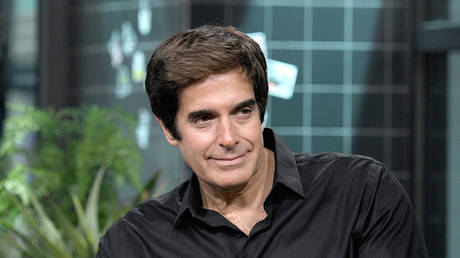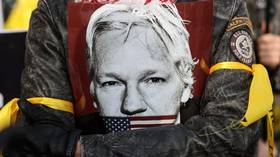The Guardian’s Vilification of Julian Assange
by Jonathan Cook, Consortium News:

It is welcome that finally there has been a little pushback, including from leading journalists, to The Guardian’s long-running vilification of Julian Assange, the founder of Wikileaks.
Reporter Luke Harding’s latest article, claiming that Donald Trump’s disgraced former campaign manager Paul Manafort secretly visited Assange in Ecuador’s embassy in London on three occasions, is so full of holes that even hardened opponents of Assange in the corporate media are struggling to stand by it.
Faced with the backlash, The Guardian quickly – and very quietly – rowed back its initial certainty that its story was based on verified facts. Instead, it amended the text, without acknowledging it had done so, to attribute the claims to unnamed, and uncheckable, “sources”.
The propaganda function of the piece is patent. It is intended to provide evidence for long-standing allegations that Assange conspired with Trump, and Trump’s supposed backers in the Kremlin, to damage Hillary Clinton during the 2016 presidential race.
The Guardian’s latest story provides a supposedly stronger foundation for an existing narrative: that Assange and Wikileaks knowingly published emails hacked by Russia from the Democratic party’s servers. In truth, there is no public evidence that the emails were hacked, or that Russia was involved. Central actors have suggested instead that the emails were leaked from within the Democratic party.
Nonetheless, this unverified allegation has been aggressively exploited by the Democratic leadership because it shifts attention away both from its failure to mount an effective electoral challenge to Trump and from the damaging contents of the emails. These show that party bureaucrats sought to rig theprimaries to make sure Clinton’s challenger for the Democratic nomination, Bernie Sanders, lost.
To underscore the intended effect of the Guardian’s new claims, Harding even throws in a casual and unsubstantiated reference to “Russians” joining Manafort in supposedly meeting Assange.
Manafort has denied the Guardian’s claims, while Assange has threatened to sue The Guardian for libel.
‘Responsible for Trump’
The emotional impact ofThe Guardian is to suggest that Assange is responsible for four years or more of Trump rule. But more significantly, it bolsters the otherwise risible claim that Assange is not a publisher – and thereby entitled to the protections of a free press, as enjoyed by The Guardian or The New York Times – but the head of an organization engaged in espionage for a foreign power.
The intention is to deeply discredit Assange, and by extension the Wikileaks organization, in the eyes of right-thinking liberals. That, in turn, will make it much easier to silence Assange and the vital cause he represents: the use of new media to hold to account the old, corporate media and political elites through the imposition of far greater transparency.
The Guardian story will prepare public opinion for the moment when Ecuador’s rightwing government under President Lenin Moreno forces Assange out of the embassy, having already withdrawn most of his rights to use digital media.
It will soften opposition when the UK moves to arrest Assange on self-serving bail violation charges and extradites him to the US. And it will pave the way for the US legal system to lock Assange up for a very long time.
For the best part of a decade, any claims by Assange’s supporters that avoiding this fate was the reason Assange originally sought asylum in the embassy was ridiculed by corporate journalists, not least at the Guardian.
Even when a United Nations panel of experts in international law ruled in 2016 that Assange was being arbitrarily – and unlawfully – detained by the UK, Guardian writers led efforts to discredit the UN report. See here and here.
Now Assange and his supporters have been proved right once again. An administrative error this month revealed that the US justice department had secretly filed criminal charges against Assange.
Heavy Surveillance
The problem forThe Guardian, which should have been obvious to its editors from the outset, is that any visits by Manafort would be easily verifiable without relying on unnamed “sources”.
Glenn Greenwald is far from alone in noting that London is possibly the most surveilled city in the world, with CCTV cameras everywhere. The environs of the Ecuadorian embassy are monitored especially heavily, with continuous filming by the UK and Ecuadorian authorities and most likely by the US and other actors with an interest in Assange’s fate.
The idea that Manafort or “Russians” could have wandered into the embassy to meet Assange even once without their trail, entry and meeting being intimately scrutinized and recorded is simply preposterous.
According to Greenwald: “If Paul Manafort … visited Assange at the Embassy, there would be ample amounts of video and other photographic proof demonstrating that this happened. The Guardianprovides none of that.”
Former British ambassador Craig Murray also points out the extensive security checks insisted on by the embassy to which any visitor to Assange must submit. Any visits by Manafort would have been logged.
In fact, The Guardian obtained the embassy’s logs in May, and has never made any mention of either Manafort or “Russians” being identified in them. It did not refer to the logs in its latest story.
Murray:
The problem with this latest fabrication is that [Ecuador’s President] Moreno had already released the visitor logs to the Mueller inquiry. Neither Manafort nor these “Russians” are in the visitor logs … What possible motive would the Ecuadorean government have for facilitating secret unrecorded visits by Paul Manafort? Furthermore it is impossible that the intelligence agency – who were in charge of the security – would not know the identity of these alleged “Russians”.
No Fact-Checking
It is worth noting it should be vitally important for a serious publication like The Guardian to ensure its claims are unassailably true – both because Assange’s personal fate rests on their veracity, and because, even more importantly, a fundamental right, the freedom of the press, is at stake.
Given this, one would have expected The Guardian’s editors to have insisted on the most stringent checks imaginable before going to press with Harding’s story. At a very minimum, they should have sought out a response from Assange and Manafort before publication. Neither precaution was taken.
I worked for The Guardian for a number of years, and know well the layers of checks that any highly sensitive story has to go through before publication. In that lengthy process, a variety of commissioning editors, lawyers, backbench editors and the editor herself, Kath Viner, would normally insist on cuts to anything that could not be rigorously defended and corroborated.
And yet this piece seems to have been casually waved through, given a green light even though its profound shortcomings were evident to a range of well-placed analysts and journalists from the outset.
That at the very least hints that The Guardian thought they had “insurance” on this story. And the only people who could have promised that kind of insurance are the security and intelligence services – presumably of Britain, the United States and / or Ecuador.
It appears The Guardian has simply taken this story, provided by spooks, at face value. Even if it later turns out that Manafort did visit Assange, The Guardian clearly had no compelling evidence for its claims when it published them. That is profoundly irresponsible journalism – fake news – that should be of the gravest concern to readers.
Read More @ ConsortiumNews.com
Loading...



